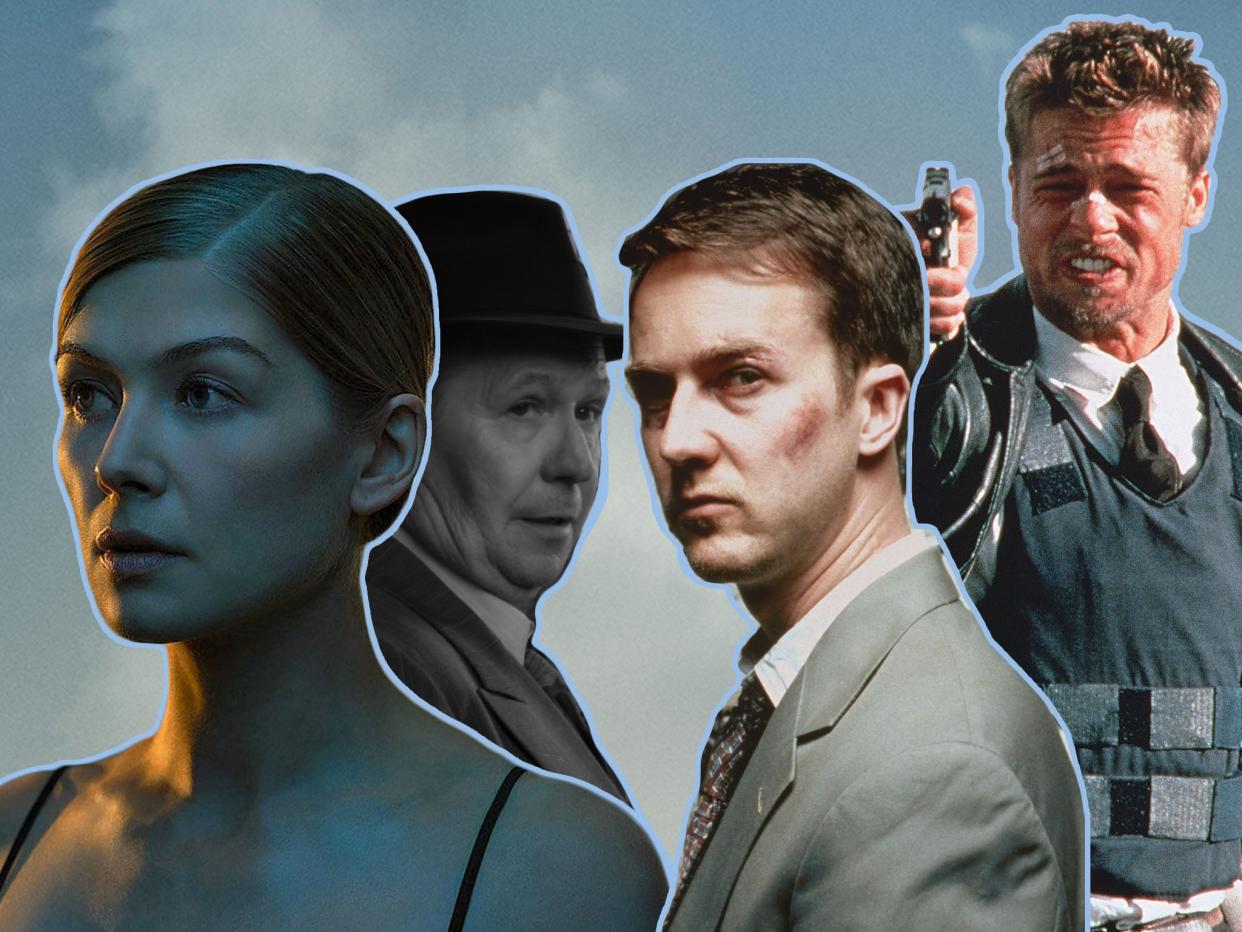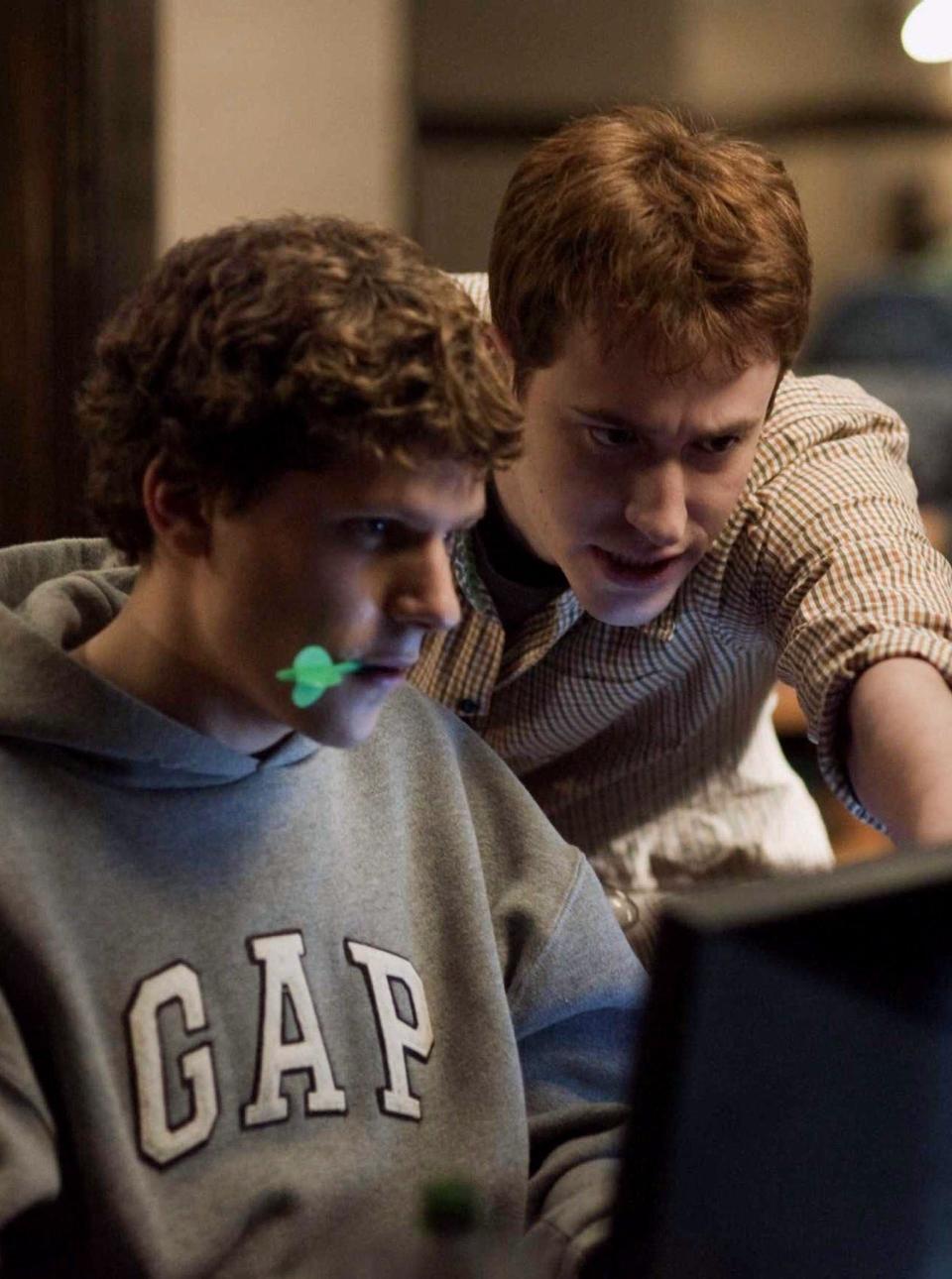David Fincher: His movies ranked, from Fight Club to Mank

Leading lights: (from left) Rosamund Pike in ‘Gone Girl’, Gary Oldman in ‘Mank’, Edward Norton in ‘Fight Club’ and Brad Pitt in ‘Se7en’
(Netflix/Rex)Famously fastidious, notoriously exasperating, and singularly talented, David Fincher is one of our greatest living filmmakers. His projects are pop-culture events, and guarantees of at least some form of storytelling wonder.
He’s even survived a move to Netflix, his new film Mank just as detailed, meticulous and aesthetically rich on a small screen as it would have been in cinemas. It’s also inspired us to look back, soak in all that Finchery goodness, and rank his 11 feature films so far.
From Rosamund Pike slashing throats and punishing bad men to that head in that box, here follows all of Fincher’s films, in order from worst (or, truthfully, least great) to undeniable best.
11. Alien 3 (1992)
In the aftermath of his Alien sequel, Fincher told a reporter that he’d rather have colon cancer than direct another film. He changed his mind, obviously, but Alien 3 remains an infamous part of his legacy all the same. This troubled sci-fi thriller served as his feature film debut, and it feels very much like the product of tussles behind the camera. He’s been a bit melodramatic about its awfulness, though. Alien 3 is fine – a sequel that suffers in comparison to its preceding movies, but one that has a haunting nihilism to it that makes it sort of interesting.
10. The Curious Case of Benjamin Button (2008)
There is a majesty to The Curious Case of Benjamin Button that rescues it from being slightly unbearable. Alexandre Desplat’s score is moving, there are wonderfully tender supporting performances from the likes of Taraji P Henson and Mahershala Ali, and the special effects are impressive. Yet this is also a bit of a slog, frustratingly episodic and dramatically sterile considering the wonder of its central premise, which casts Brad Pitt as a man born elderly and who ages in reverse. It’s also the most awarded of all of Fincher’s films, which is an intriguing bit of trivia for a movie so unlike anything else on Fincher’s CV.
9. The Game (1997)
Is The Game one of the most influential movies of the past 25 years that barely gets recognised as such? The Michael Douglas thriller is a Gen-X Hitchcock film, with touches of corporate conspiracy and deliberate surrealism that feel like precursors to The Matrix and most of Christopher Nolan’s output. Douglas stars as a banker participating in a living game, and one that sends him down a number of real-world rabbit holes. Borrowing much of the rain-soaked paranoia of Se7en, Fincher’s previous film, The Game is certainly absorbing, but it undeniably runs out of steam at its midpoint. Fincher has admitted as much himself, saying in 2014 that he never properly figured out its third act.

Rooney Mara in ‘The Girl with the Dragon Tattoo’
Sony8. The Girl with the Dragon Tattoo (2011)
There was always something of an inevitability to Fincher directing the US adaptation of Stieg Larsson’s Swedish bestsellers. His Dragon Tattoo almost operates as a greatest hits collection, bearing the skin-crawling violence of Se7en, the physical brutality of Fight Club, and the conspiratorial deep-dives of The Game. It’s still great, though – maximalist, chilly and with style and texture for days. It’s also one of the strongest cases for Fincher being a master at casting as well as directing. Daniel Craig, never the most expressive of actors, is perfect for the role of disgraced journalist Mikael Blomkvist, Robin Wright saunters through the film as his glamorous ex, and Rooney Mara gives heroic Lisbeth Salander an oddball, comic energy that proves nicely distinct from Noomi Rapace in the original films.
7. Panic Room (2002)
Panic Room is a lean and gnarly little thriller that tends to be overlooked in the Fincher oeuvre, potentially because its narrative ambitions are relatively minor. There is a sense that Fincher viewed this more as a visual experiment than anything else – it’s a home invasion movie built for big, swooping camera movements, dreamy set design and technical wizardry, with plot almost superfluous. It’s also a masterclass in sustained tension, though, with a wonderfully cast Jodie Foster and Kristen Stewart as a mother/daughter pair under siege.
6. Mank (2020)
Fincher’s latest film is also his least accessible. It’s a cold, misanthropic endeavour, one that is steeped in a quiet rage at a film industry built upon dreams and fantasy but swimming in corruption. Based on a script by Fincher’s late father, it uses the making of Citizen Kane as a starting point for a tale as celebrating of Hollywood’s contradictions as it is repulsed by them. Because it feels so personal, both behind the camera and what it says about filmmaking and the Hollywood machine, we’re very much kept at a distance. It means Mank is far more interesting to think about in the aftermath than it is to watch unfold before you. Still, Amanda Seyfried is divine as the sharp and daffy Marion Davies, and Fincher directs with characteristic zhush, monochrome fitting him like an immaculately pressed suit.
5. Fight Club (1999)
Even before it became a Tumblr staple and the favourite movie of every basement-dwelling misogynist, it was impossible to separate Fight Club from the ideas that surrounded Fight Club. It’s partly how these things go. If a movie is to depict toxic masculinity, it must contend with discussion over whether it endorses it or not. Let alone that many people will watch and embrace the very things being mocked or satirised... because people. It gets to the root of why this movie is so powerful, though. This is an angry, messy and incredibly funny dissection of white men in perma-adolescence, with Brad Pitt’s Tyler Durden a fantasy pin-up for all of life’s unfortunates. Elsewhere, Edward Norton is snivelling perfection, and Helena Bonham Carter the most deliciously cynical of femme fatales. Dripping in latent homoeroticism and daring to go to truly wild places over the course of its two hours, Fight Club is hard to love but impossible to not get a kick out of.
4. Zodiac (2007)
A number of Fincher’s early films struggled with their endings, the filmmaker deliberately avoiding catharsis or resolution. Zodiac might be as good as it is because the lack of resolution is the point. No one ever identified the Zodiac Killer who roamed the streets of San Francisco at the turn of the 1970s. This leaves Fincher free to mine the obsessions and disappointments of those in hot pursuit instead. Zodiac is also a feast of a movie, overflowing with mist, headlights in the dark and fingers rifling through boxes of old newspapers.
3. Gone Girl (2014)
During a 2017 appearance on James Corden’s US talk show, Anne Hathaway named Gone Girl as her favourite romantic comedy, inspiring an awkward silence from the men on either side of her. But the moment’s piercing discomfort succinctly reflected the sneaky black comedy of Gone Girl, and how masterfully Fincher crosses tones in it. His adaptation of Gillian Flynn’s twisty bestseller, scripted by Flynn herself, is absurd pulp that is also a nasty deconstruction of American mythology and the institution of marriage. A never-better Ben Affleck stars as a philandering man-child whose wife (a beguiling and unpredictable Rosamund Pike) suddenly disappears.
2. Se7en (1995)
Se7en plays host to many of Fincher’s strongest signifiers: oppressive rain, intimidating cityscapes, queasy horror. But its genius is in its sense of balance, contrasting violent misery with heartbreaking snapshots of hope. It helps that its three key leads (Morgan Freeman’s kindly detective, Brad Pitt his younger, cockier apprentice and Gwyneth Paltrow as Pitt’s tragic wife) are all so human – soulful dreamers stranded in a bleak quagmire. Otherwise, this is technically marvellous, deeply frightening, and home to one of cinema’s all-time greatest endings.

Jesse Eisenberg and Joseph Mazzello in ‘The Social Network’
Sony1. The Social Network (2010)
Back in 2010, Fincher’s decision to make a withering epic about the founding of Facebook seemed almost silly. A decade later, with Facebook widely viewed as one of the biggest threats to global democracy and a multi-pronged spreader of sociopolitical disinformation, those early detractors have never looked so naive. The Social Network is a pulsating treatise on power, masculinity and loneliness, and the unique dangers presented when bitterness and greed mixes with rampant ignorance. Everything here works: those snide, irritable performances from Jesse Eisenberg, Andrew Garfield and Armie Hammer; the glory of Rooney Mara’s two major scenes; the fact that Aaron Sorkin’s script is somehow brilliant rather than smug and annoying; Trent Reznor and Atticus Ross’s score being pure ear candy. This isn’t just Fincher’s best film – it’s also the most important film of the 21st century.
Read More
Mank is a 16 oz steak of a film with pudding after
Amy Adams’s 10 best performances, ranked


